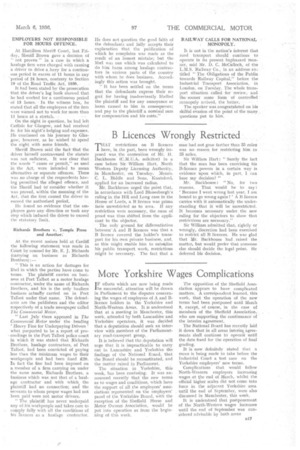B Licences Wrongly Restricted
Page 27

If you've noticed an error in this article please click here to report it so we can fix it.
THAT restrictions on 73 licences have, in the past, been wrongly imposed was the contention of Mr. H. 13ackhouSe (C.M.U.A. solicitor) in a case before Sir. •William Hart, North Western Deputy Licensing Authority, in Manchester, on Tuesday. 241essrS. C. L. Biddle and Sons, Knutsford, applied for an increased radius.
Mr. Backhouse urged the point that, in accordance with Lord Blanesbnrgh's ruling in the Hill and Long ease in the House of Lords, a B licence was prima facie unrestricted as to area. If any restriction were necessary, the onus of proof was thus shifted from the applicant to -the objector, . The. only ground for differentiation between 'A and B licences was that a B licence covered the holder's transport for his awn private business, and, as this might enable him to subsidize his public transport work, restrictions might be necessary. The fact that a
man had not gime farther than 35 milet was no reason for restricting him to 35 miles. '
Sir William Hart: " Sorely the fact that the man has been exercising his B-licence powers in a certain way is evidence upon which, in part, I, can base my decision.? " •
Mr.' Backhonse: "IsTo, for two reaeons. That would be to say : ' Because I went wrong last year, I am bound to go wrong again! ' A B licence carries with it automatically the understanding that it will he unrestricted. It becomes neceseary under, the new ruling for the objectors to show that restrictions are necessary." • Sir William admitted that, rightly or wrongly, discretion had been exercised to restrict all B licences, He was glad that Mr. Baekhouse had raised the . matter, but would prefer that someone else should decide the legal point. He deferred his decision,




















































































